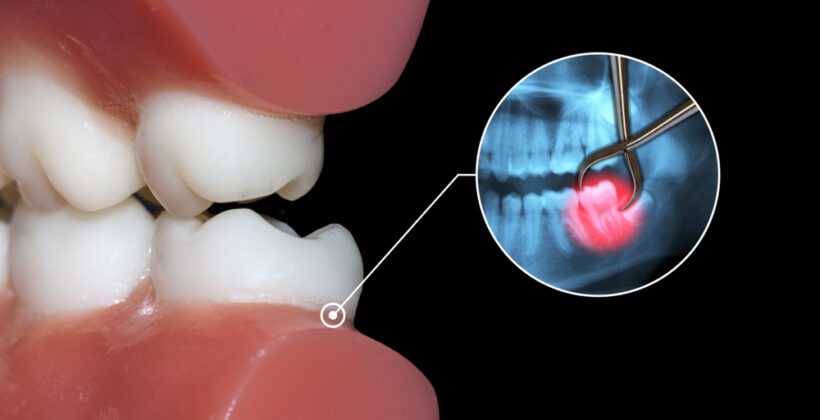If a dentist has recommended tooth extraction, and you feel that the diagnosis is inaccurate or that the treatment is unnecessary, it’s okay to seek a second opinion. Tooth removal should always be a last resort, though in many cases it is the best treatment option to restore good oral health and comfortable oral function.
Reasons for tooth extraction:
- Extensive, irreparable tooth decay, internal infection, or damage
- Impaction, as is often the case with third molars (wisdom teeth)
- Teeth will not fit properly within the dental arch (crowding)
- Preparation for orthodontics
- Preparation for dentures
- Luxation (displacement due to trauma)
- Periodontitis (acute gum disease), causing damage to bone and surrounding connective tissues
However, some dentists are more conservative than others. This means that dentists with Dr. Glud’s clinical philosophy will opt to save a healthy or reparable tooth whenever possible unless the patient prefers extraction.
The bottom line is, your dentist needs to provide a thorough explanation of his or her case findings, answer all of your questions, then discuss treatment options with you. If you don’t feel satisfied with your case presentation and treatment options, you need a second opinion–for peace of mind, if nothing else.
Seeking a second opinion about tooth extraction is not disloyal or manipulative. It’s wise.
Alternatives to Tooth Extraction
Dr. Glud can only provide a diagnosis and treatment options after she comprehensively evaluates your oral health, x-rays, health history, and medication list.
Some lifestyle factors also influence oral health and, thus, Dr. Glud’s treatment recommendations. For example, continued smoking or other tobacco use in a patient with extensive gum disease is a lifestyle factor that inhibits healing and further advances the condition. In this case, though there may be other options, tooth extraction might be the best choice.
By diagnosis, the following list shows options patients may have to avoid tooth removal.
-
Extensive, irreparable tooth decay, internal infection, or damage
Possible alternatives: A significantly damaged tooth may qualify for root canal therapy or a full dental crown. However, extraction is necessary when restorative treatment will not effectively restore good oral health and function.
-
Impaction, as with third molars (wisdom teeth)
Possible alternatives: Crowding or insufficient space in the jaw can lead to third molar impaction. Once a wisdom tooth becomes impacted, the risk for pain and infection increases. Therefore, impacted teeth are often extracted.
Preventive wisdom tooth removal is popular because even if the third molars are not impacted, once they erupt during the late teens or early adulthood, crowding may cause ineffectiveness in daily oral hygiene. This can result in decay and infection, so extraction may be recommended.
-
Teeth will not fit properly within the dental arch (crowding)
Possible alternatives: The dental arch can be expanded to accommodate permanent teeth, and braces can reposition teeth for the best esthetics and occlusion. In fact, Invisalign incorporates arch expansion in its process. However, extraction may be necessary.
-
Preparation for orthodontics
Possible alternatives: In some cases, a dentist or orthodontist may suggest extraction prior to placing orthodontic braces. Many factors influence this decision, so talk with your orthodontist or Dr. Glud about whether extraction is your only option.
-
Preparation for dentures
Possible alternatives: Dentures, by definition, replace all teeth on the upper or lower arch. If you want to retain your healthy teeth and replace lost teeth, ask if bridges and/or partials would work well for you.
-
Luxation (displacement due to trauma)
Possible alternatives: Once a tooth’s supportive structure is compromised, it may not regenerate. A tooth needs a firm socket within the jaw bone, blood supply, and connective tissues to remain healthy and immovable within the mouth. Ask your dentist if periodontal splinting might save your luxated tooth.
-
Periodontitis (acute gum disease), causing damage to bone and surrounding connective tissues
Possible alternatives: Bone and gum grafts can, in some cases, restore dead, dying, and/or removed gum and bone tissue. If you can commit to practicing excellent oral hygiene at home, attending frequent dental visits, and refraining from lifestyle factors that negatively impact oral health, you may be a candidate for grafting to save your teeth from extraction and/or loss.
Call for a Second Opinion on Tooth Removal
Has a dentist advised that removing one or more teeth is your best treatment option? In many cases, patients have alternative treatment choices, though in some situations extraction is warranted.
If you’d like a second opinion from a respected, conservative dentist, call for an appointment with Dr. Julie Glud. Our Lombard dental office serves patients of all ages, and we look forward to discussing how to restore your mouth to excellent health and comfortable function

